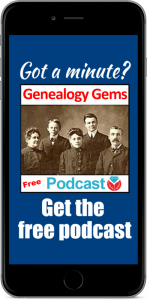by Lisa Cooke | Oct 26, 2016 | 01 What's New, Amish & Mennonite |
Anabaptist genealogy records include Amish, German Baptist and Mennonite ancestors. In a past post titled “Amish Genealogy Revealed,” we shared tips for searching out your Amish family tree. Here are more helpful resources submitted by our wonderful readers that you won’t want to miss.
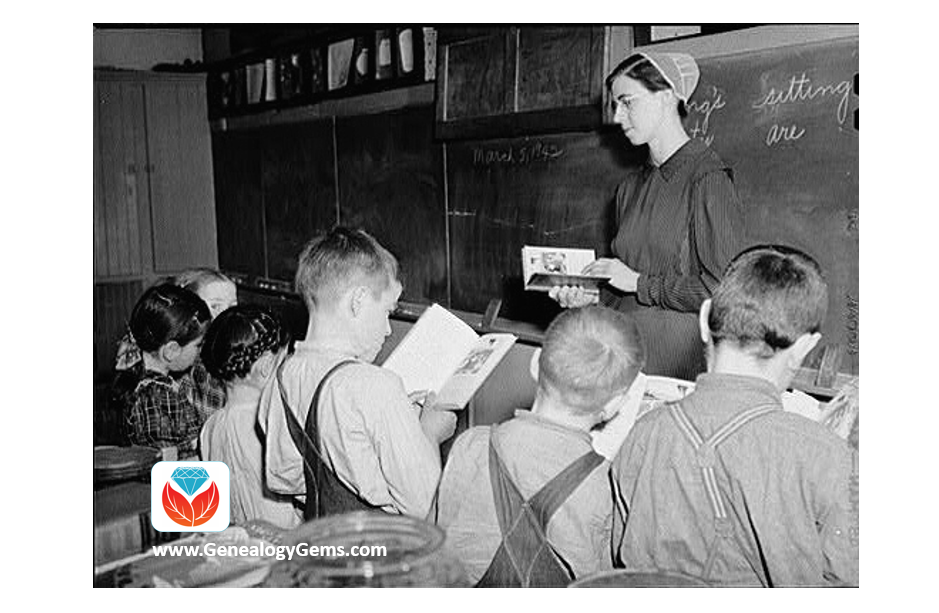
What is an Anabaptist?
The term Anabaptist refers to those religions who reject infant baptism in favor of a believer’s baptism. Amish, Mennonite, and German Baptists fall into the category of Anabaptists.
Anabaptist religions often subscribe to more conservative views and dress. Their families are very much intertwined with their religion, making the study of their history rich in detail and customs.
Anabaptist Genealogy Records: More Amish and Mennonite Family History Resources
We shared in our “Amish Genealogy Revealed,” the resources of the Amish newspaper, The Budget, the Amish church directories, and newsletters and books on Amish families. Many thanks to reader Loren Johns for sharing yet another amazing resource. Loren shared:
As someone who has a couple of hundred thousand Amish in my genealogical database, I enjoyed reading your focus on Amish genealogy. Somewhat surprised to see it!
You did not mention the
most important source for Amish genealogy. It is the
Swiss Anabaptist Genealogical Association, of which I am the secretary. This is a rather informal non-profit association of amateur genealogists interested in Amish and Mennonite genealogy who share their research with each other and with others interested in it, and make it available online.
Further, Mr. Johns shares that the Swiss Anabaptist Genealogical Association (SAGA) maintains a large database of un-merged databases that can be searched simultaneously. He gives an example:
If I search for an Amos J. Whetstone (an Amish name,) I get 17 hits, to three separate men. Amos J. Whetstone (1903-1984) appears in 6 different databases; Amos J. Whetstone (1919-2003) appears in 4 databases; and Amos J. Whetstone (1945- ) appears in 7 databases … so the 17 hits actually represent three men.
This amazing SAGA database contains over 5,000,000 names, though many of those are duplicates. You can imagine the value of such a large database for this specific group. If you are interested in joining SAGA and gaining access to the database, see the membership page
here.
Lastly, Mr. Johns leaves us with this fine tip!
A most important book on Amish genealogy is Amish and Amish Mennonite Genealogies by Hugh Gingerich and Rachel Kreider. It is sometimes called the Amish genealogy “Bible.” It traces all of the Amish immigrant ancestors (144 different surnames) and their families to 1850, where it had to stop lest it explode into an encyclopedia.
Anabaptist Genealogy Records: Resources for the German Baptist or The Old German Baptist Brethren
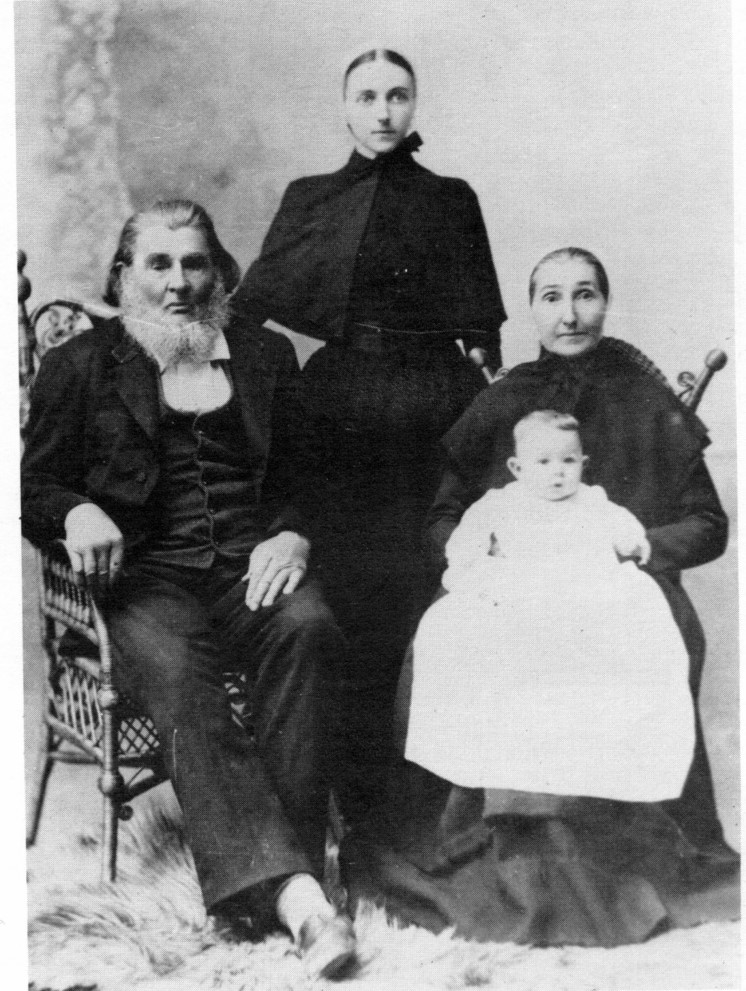
George Funderburg and family were members of the German Baptist faith.
Another group of Anabaptist’s are the German Baptist, also known as the Old German Baptist Brethren. Here in Ohio, we sometimes refer a particular break-off by their nickname, Dunkards. The Dunkards were given this nickname for their belief in baptism by immersion.
It is my own family ancestors who were among the Dunkards. Luckily, we have a wonderful archive in Brookville, Ohio called Brethren Heritage Center. The Brethren bodies involved with the Brethren Heritage Center are:
- Church of the Brethren
- Conservative Grace Brethren International
- Dunkard Brethren
- Fellowship of Grace Brethren Churches
- German Baptist Brethren
- Old Brethren
- Old Brethren German Baptist
- Old German Baptist Brethren
- Old German Baptist Brethren-New Conference
- Old Order German Baptist
- The Brethren Church
This heritage center offers many books and collections including family histories, maps, letters, diaries, census records, and birth records. In particular, the heritage center website also has a large list of helpful links to begin researching your Brethren ancestors. To see the list of links, click here.
Anabaptist Genealogy Records – Share Your Knowledge
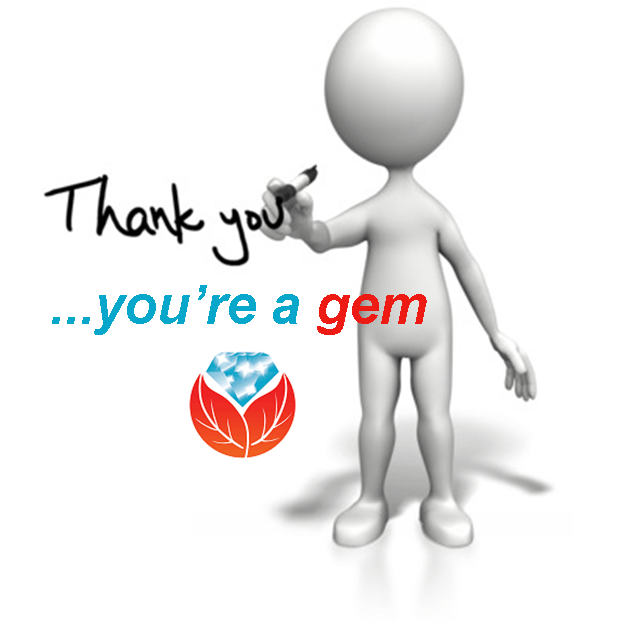 If you have Anabaptist heritage, you may be aware of additional Anabaptist genealogy records that we have not mentioned. We would be delighted if you would share that information with our Genealogy Gems community in the comments below. We look to you to be an inspiration and teacher to us here at The Genealogy Gems Podcast, and you always come through. Thank you!
If you have Anabaptist heritage, you may be aware of additional Anabaptist genealogy records that we have not mentioned. We would be delighted if you would share that information with our Genealogy Gems community in the comments below. We look to you to be an inspiration and teacher to us here at The Genealogy Gems Podcast, and you always come through. Thank you!
by Lisa Cooke | Jan 10, 2019 | 01 What's New, Genealogy Gems Podcast
Genealogy Gems Podcast Episode 225 Get ready for a fun and inspiring start to your new genealogy year. I’m not going to lecture you about how to get organized and all that – you get enough of that New Year banter other places. Today I’m going to bring you a talented...
by Lisa Cooke | Nov 24, 2017 | 01 What's New, Freebies
Our Black Friday genealogy sale is on! Start with a limited-time FREE viewing of the new Premium video, Your Guide to Cloud Backup. Then snatch up rare and exclusive savings on Backblaze cloud backup service, a new mobile genealogy bundle, and our new Irish guide and Irish genealogy guide bundle!

Backblaze Cloud Backup Sale: A Genealogy Gems Exclusive
Backblaze continually backs up all your computer files to a remote ‘cloud’ server. In the event of any loss (including a computer crash), all of your files can be restored. Ensure your research is protected from disaster with Backblaze!

Use coupon code gems2017cyber for 10% off any new Backblaze subscription. Offer good through November 27, 2017. Check it out at www.Backblaze.com/Lisa.
Not Sure About the Cloud? Watch this Free Video Now
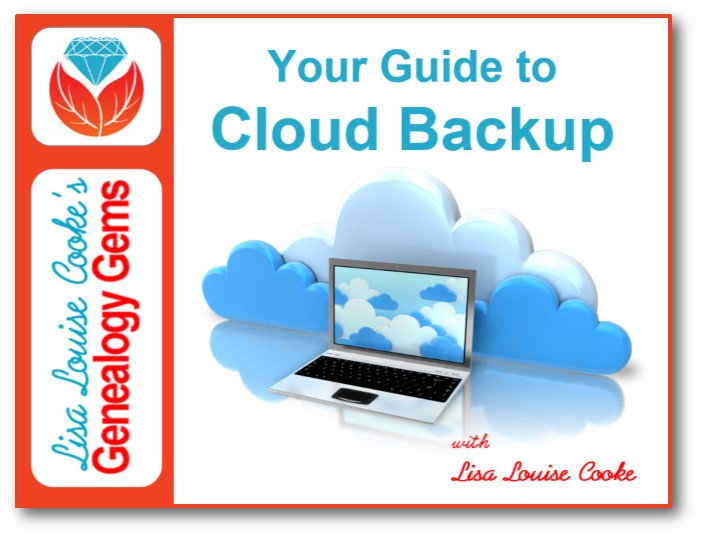 Now through next Monday, November 27, 2017, you can watch the new Genealogy Gems Premium Video for FREE. In this brand new, half-hour video tutorial, Lisa Louise Cooke will provide answers to questions like:
Now through next Monday, November 27, 2017, you can watch the new Genealogy Gems Premium Video for FREE. In this brand new, half-hour video tutorial, Lisa Louise Cooke will provide answers to questions like:
- What is cloud backup?
- Why should I use cloud backup?
- How does cloud backup work?
- Is cloud backup safe?
- What should I look for when selecting a cloud backup service?
Click here to watch right now for free!
Mobile Genealogy: NEW Value Bundle
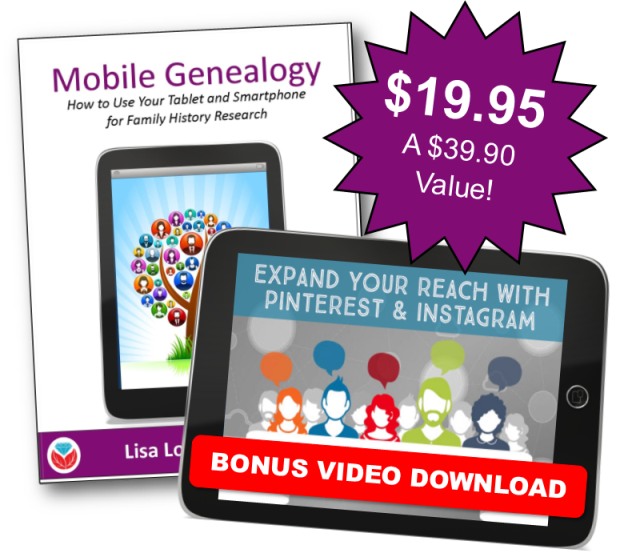
Included in this special, limited-time bundle:
Mobile Genealogy: How to Use Your Tablet & Smartphone for Family History Research
by Lisa Louise Cooke (paperback book)
Whether you have an iPad, an Android tablet, or a smartphone (or all three), Mobile Genealogy will help you put them to work for your genealogy research. Explore apps in-depth, get the latest cutting-edge strategies for mobile genealogy and family history, and use Lisa’s tips and tricks to make your mobile device a genealogy powerhouse!
Using Social Media for Family History
by Lisa Louise Cooke (45 min. video)
Discover how sharing your research on social media can benefit you, your family, and your research. Lisa will focus on two of the top site that you might not be using: Pinterest and Instagram. They are fun and easy to use, and the perfect place to reach the next generation.
The bundle is a $39.90 value but this weekend you’ll pay just $19.95.
Available through Monday, November 27.
Click here to buy it now!
(Bundle includes print book and video class download. Book ships to U.S. and Canada only.)
NEW Irish Genealogy Guide #3: Land, Tax and Estate Records
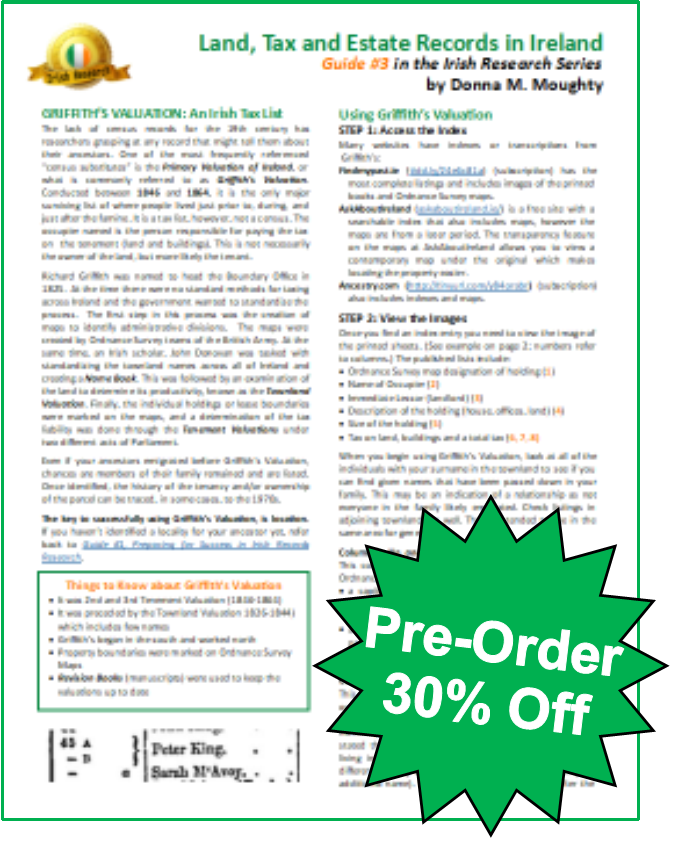 Donna Moughty’s Irish Guide series has proven so popular, we’re adding a third one! Jump on our Black Friday pre-order sale (shipping begins approximately Dec. 11, 2017) and you’ll get 30% off Irish Guide #3: Land, Tax, and Estate Records.
Donna Moughty’s Irish Guide series has proven so popular, we’re adding a third one! Jump on our Black Friday pre-order sale (shipping begins approximately Dec. 11, 2017) and you’ll get 30% off Irish Guide #3: Land, Tax, and Estate Records.
This Guide explains how and why Griffith’s Valuation was done, and how to use it to glean the most information about your family. After Griffith’s Valuation, the Revision Books allow you to follow the land and in some cases, to the 1970s, possibly identifying cousins still living on the land. Quick reference guide includes:
- Explanation of the columns in Griffith’s Valuation
- Rules under which Griffith’s Valuation was done.
- Tips for using Griffith’s to find your family
- Using the Revision Books to identify life events
- The Tithe Applotment, an earlier tax list
- Landed Estate Courts
- Estate Records
Get the guide here.
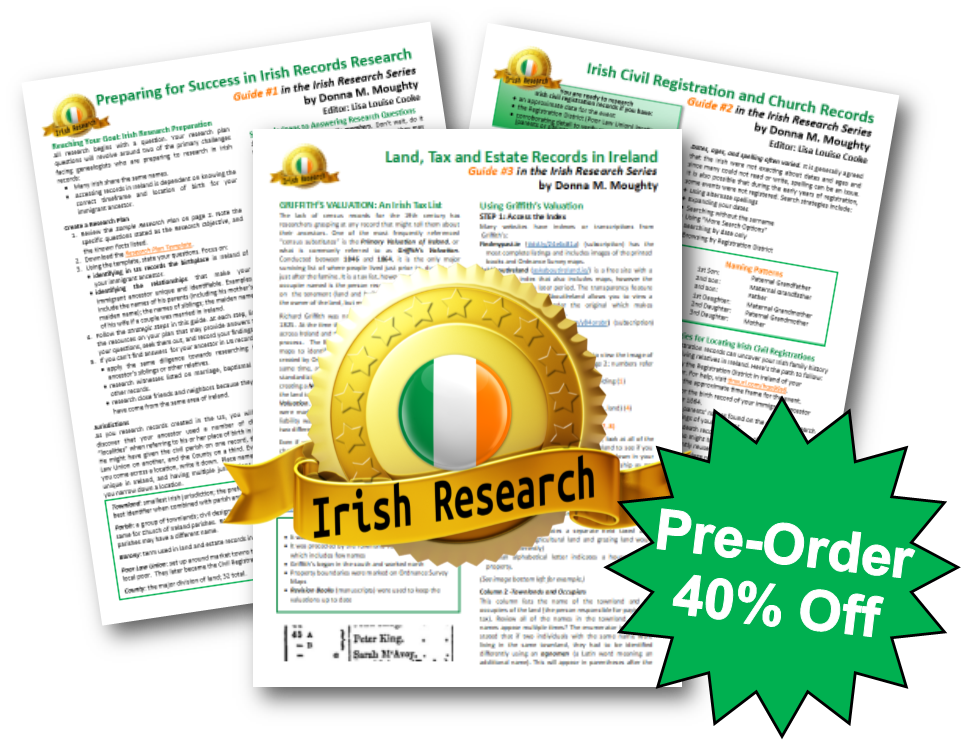
Save even more! Get 40% off the entire 3-guide Irish genealogy research bundle by Donna Moughty:
- Irish Guide #1: Preparing for Success in Irish Records Research
- Irish Guide #2: Irish Civil Registration and Church Records
- Irish Guide #3: Land, Tax, and Estate Records
Purchase all three for only $20.90 through Monday, November 27, 2017. (Guides ship to U.S. and Canada only. Shipping estimated to begin December 11, 2017 on orders including Irish Guide #3.)
Get the bundle here.
40% off How to Find Your Family History in Newspapers
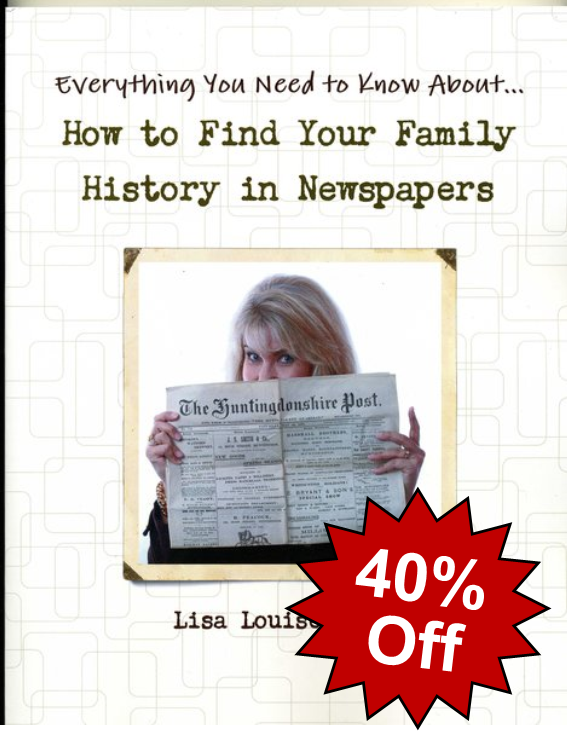 Lisa Louise Cooke’s tried and true methodology for genealogical newspaper research! If you think you know how to search for newspapers, this book will make you think again.
Lisa Louise Cooke’s tried and true methodology for genealogical newspaper research! If you think you know how to search for newspapers, this book will make you think again.
Retail: $24.95
Sale Price: $14.97
Get it here.
*Sale on paperback only
Please Share these Black Friday Genealogy Gems

Please share these gems with your genealogy friends–or send them as your “wish list” to a loved one. Remind them to act quickly as these offers are only good through Monday, November 27, 2017.
by Sunny | Jun 29, 2018 | 01 What's New, FamilySearch, Records & databases, Swedish
It’s a Scandinavian genealogy dream come true: over 135 million new free records at FamilySearch! Also new (and free): church records for England, France, Germany; Italian and Mexican civil registration; archival indexes for The Netherlands; South African court...
by Lisa Cooke | Jun 16, 2023 | 01 What's New, Genealogy Gems Podcast, Records & databases, Research Skills
Show Notes: Professional Genealogist J Mark Lowe joins Lisa Louise Cooke on the show to share a marriage research case study that highlights the importance of understanding Gretna Greens. Then Professional Genealogist and blogger Robyn Smith shares her 3 step process for researching witnesses found on records from her new Family Tree Magazine article Witness Testimony.
Listen to the Podcast Episode
To Listen click the media player below (AUDIO ONLY):
- 01:29 Marriage Research Case Study with J Mark Lowe.
- 27:15 Researching Witnesses with Robyn Smith
Watch the Videos
Watch Lisa Louise Cooke’s video interview with J Mark Lowe on the Marriage Research Show Notes page.
Watch Lisa Louise Cooke’s video interview with Robyn Smith on the Researching Witnesses Show Notes page.
Genealogy Gems Premium Members Exclusive Download:
Log into your Premium membership and then download the handy show notes PDFs that complement the topics covered in this podcast episode:
Become a Genealogy Gems Premium Member
Premium Members have exclusive access to:
Become a member here. Learn more about Genealogy Gems Premium Membership.
Our Sponsors:

Get 20% off a Publisher Extra subscription. Click here and use coupon code GenealogyGems

Visit Fort Wayne
Fort Wayne, Indiana is the home of the second-largest free genealogy library in the country. Make your plans to visit one of my favorite genealogy libraries today!
Learn more at https://www.visitfortwayne.com
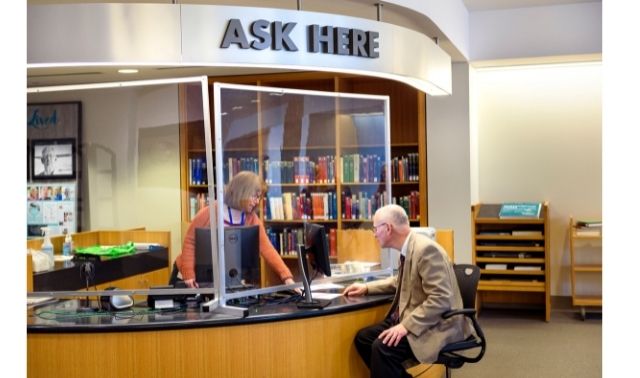
Genealogy Gems Podcast App
Don’t miss the Bonus audio for this episode. In the app, tap the gift box icon just under the media player. Get the app here.
Get the Free Genealogy Gems Newsletter
The Genealogy Gems email newsletter is the best way to stay informed about what’s available with your Premium eLearning Membership. Sign up today here.
Follow Lisa and Genealogy Gems on Social Media:
Podcast Resources
Download the episode mp3


 If you have Anabaptist heritage, you may be aware of additional Anabaptist genealogy records that we have not mentioned. We would be delighted if you would share that information with our Genealogy Gems community in the comments below. We look to you to be an inspiration and teacher to us here at The Genealogy Gems Podcast, and you always come through. Thank you!
If you have Anabaptist heritage, you may be aware of additional Anabaptist genealogy records that we have not mentioned. We would be delighted if you would share that information with our Genealogy Gems community in the comments below. We look to you to be an inspiration and teacher to us here at The Genealogy Gems Podcast, and you always come through. Thank you!











